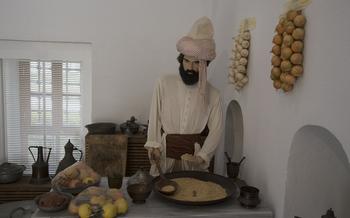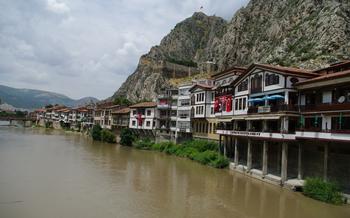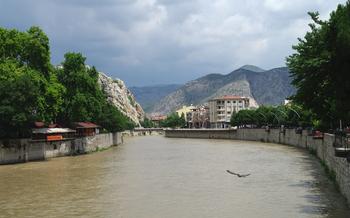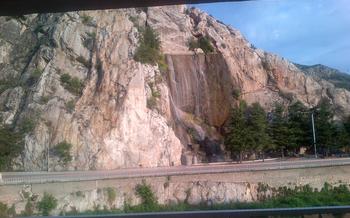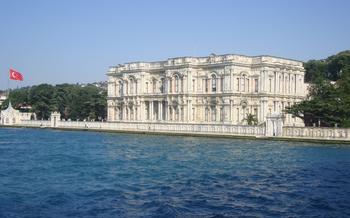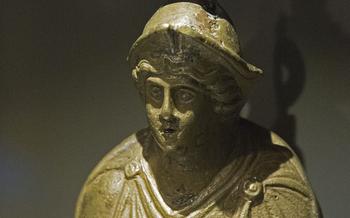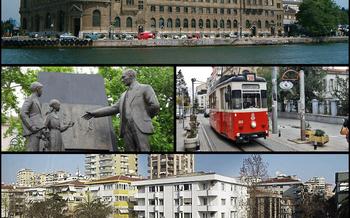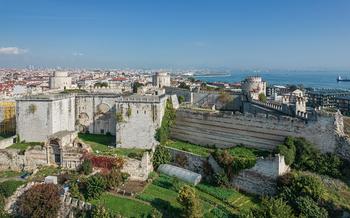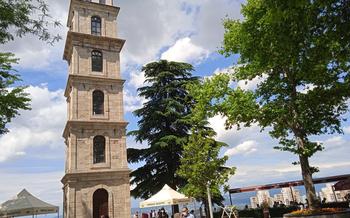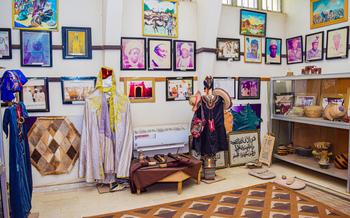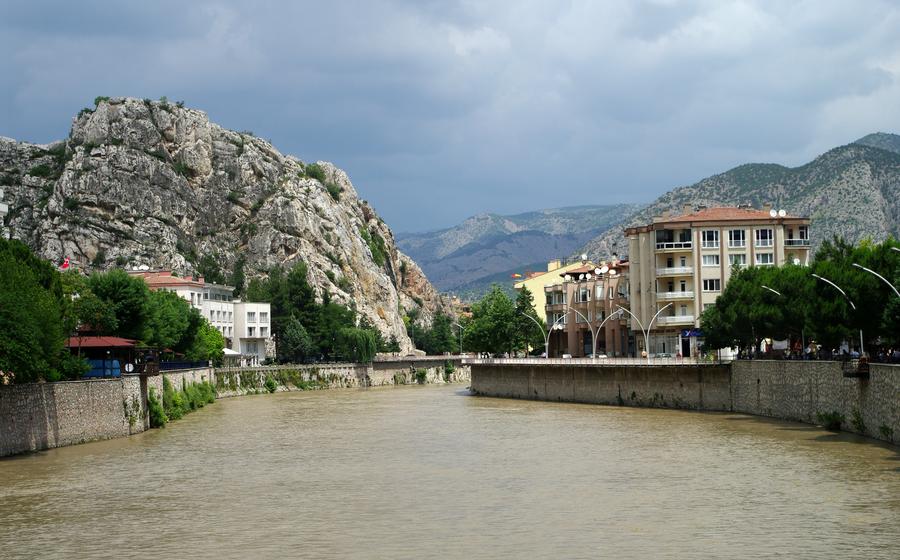
Amasya University Sultan Bayezid II Külliye Health Museum
- Amasya University Sultan Bayezid II Külliye Health Museum: A Hidden Gem
- Stepping Back in Time: The History of the Museum
- Exploring the Museum's Collections
- Interactive Exhibits for a Unique Experience
- Understanding the Legacy of Sultan Bayezid II
- Highlighting Local Medical Traditions
- Showcasing the Evolution of Medicine
- Educational Programs and Workshops
- Research and Collaboration Opportunities
- A Destination for Medical Enthusiasts
- Planning Your Visit: Essential Information
- Top Tips for a Memorable Experience
- Unveiling the Stories Behind the Artifacts
- Supporting the Museum's Mission
- Insider Tip: Hidden Treasures
Amasya University Sultan Bayezid II Külliye Health Museum: A Hidden Gem
Nestled amidst the historic streets of Amasya, Turkey, the Amasya University Sultan Bayezid II Külliye Health Museum stands as a testament to the rich medical heritage of the region. Once a bustling hospital complex during the Ottoman era, the museum now offers visitors a unique glimpse into the fascinating world of healthcare through the ages. Step inside and embark on a journey that blends history, science, and innovation, providing an unparalleled educational and interactive experience.
Stepping Back in Time: The History of the Museum
The Amasya University Sultan Bayezid II Külliye Health Museum stands as a testament to the rich history of medicine and healthcare in Turkey. Its origins can be traced back to the Ottoman period, when Sultan Bayezid II, a renowned patron of the arts and sciences, commissioned the construction of a külliye, a complex that included a mosque, a hospital, and a medical school. The külliye, completed in 1484, was a groundbreaking institution that provided medical care to the community and trained physicians in the latest medical knowledge.
The architectural design of the külliye reflects the Ottoman architectural style, with its intricate carvings, elegant domes, and spacious courtyards. The hospital, the heart of the külliye, was designed to provide a comfortable and hygienic environment for patients, featuring separate wards for men and women, as well as a pharmacy and a surgical theater. The medical school, known as the Darüşşifa, attracted students from across the empire who sought to learn from the renowned physicians and scholars who taught there.
Over the centuries, the külliye underwent several renovations and additions, reflecting the changing needs of the community. In the 19th century, the hospital was modernized and expanded, incorporating Western medical practices and technologies. In the early 20th century, the külliye was transformed into a museum, preserving its historical significance and showcasing its rich collection of medical artifacts and documents.
Exploring the Museum's Collections
The Amasya University Sultan Bayezid II Külliye Health Museum houses an extensive collection of medical artifacts that offer a glimpse into the evolution of medicine and healthcare. Visitors can marvel at ancient medical instruments, such as scalpels, forceps, and syringes, that showcase the ingenuity and skill of physicians from bygone eras. Rare manuscripts and books, adorned with intricate illustrations, provide insights into the medical knowledge and theories of the past. Anatomical models and specimens, meticulously preserved, offer a tangible representation of the human body and its complexities. The museum also features interactive displays on health and medicine, allowing visitors to engage with the exhibits and gain a deeper understanding of various medical concepts.
Interactive Exhibits for a Unique Experience
Beyond the impressive collection of artifacts, the Amasya University Sultan Bayezid II Külliye Health Museum takes visitors on an interactive journey through the history of medicine. Virtual reality simulations transport visitors back in time, allowing them to experience medical procedures from different eras. Hands-on activities, such as dissecting models and examining specimens, provide a deeper understanding of human anatomy and physiology. Multimedia presentations and documentaries offer insights into the lives of famous physicians and the evolution of medical practices. Guided tours, led by knowledgeable experts, bring the museum's collection to life, sharing fascinating stories and anecdotes about the history of medicine.
Understanding the Legacy of Sultan Bayezid II
Sultan Bayezid II, the Ottoman ruler who commissioned the construction of the Külliye, played a pivotal role in the advancement of medicine and healthcare during his reign. He was a staunch advocate for the well-being of his subjects and demonstrated a deep understanding of the importance of medical knowledge. Sultan Bayezid II actively supported scholars and physicians, providing them with resources and patronage to pursue their research and healing practices. Under his guidance, hospitals and medical schools were established, creating a fertile environment for medical innovation and education. His vision for a healthier society extended beyond the boundaries of his empire, as he sought to promote medical knowledge and practices throughout the Islamic world. Sultan Bayezid II's legacy as a patron of medicine continues to inspire and guide the work of the Amasya University Sultan Bayezid II Külliye Health Museum, ensuring that his contributions to the field of healthcare are remembered and celebrated.
Highlighting Local Medical Traditions
Beyond the impressive collection of artifacts, the Amasya University Sultan Bayezid II Külliye Health Museum also shines a light on the rich tapestry of local medical traditions. Visitors can delve into the fascinating world of traditional healing practices that have been passed down through generations in the Amasya region. Traditional healers, often referred to as "tabips," played a crucial role in the community, utilizing their knowledge of herbal remedies and folk medicine to treat a wide range of ailments. The museum showcases these traditional practices, highlighting the ingredients, techniques, and beliefs associated with them. Visitors can learn about the use of plants like chamomile, lavender, and sage for their medicinal properties, as well as the significance of rituals and incantations in the healing process. The museum acknowledges the valuable contributions of local healers, who often served as the primary healthcare providers in rural areas before the advent of modern medicine.
Showcasing the Evolution of Medicine
The Amasya University Sultan Bayezid II Külliye Health Museum offers a glimpse into the captivating evolution of medicine, spanning ancient practices to contemporary advancements. Visitors can witness the remarkable journey of medical knowledge and practices through captivating exhibits that showcase ancient medical tools, Islamic medical manuscripts, Western influences, and the latest innovations in healthcare.
The museum's collection boasts an array of ancient medical artifacts, shedding light on the practices of early civilizations. Visitors can marvel at primitive surgical instruments, explore ancient remedies and herbal treatments, and gain insights into the beliefs and approaches of healers from bygone eras. Interactive displays bring these practices to life, allowing visitors to experience the challenges and ingenuity of ancient medicine.
Islamic medicine, with its emphasis on holistic care and scientific inquiry, is well-represented in the museum. Visitors can delve into the works of renowned Islamic physicians, such as Avicenna and Al-Razi, whose writings revolutionized medical thought. Manuscripts, diagrams, and interactive exhibits showcase the groundbreaking contributions of Islamic scholars, including their advancements in surgery, pharmacology, and public health.
The museum also acknowledges the influence of Western medicine, highlighting the exchange of knowledge and ideas that shaped modern healthcare. Visitors can explore exhibits on the impact of the Renaissance and the Enlightenment on medical practices, as well as the contributions of European physicians and scientists. From the discovery of the microscope to the development of vaccines, the museum showcases the pivotal moments that transformed the field of medicine.
Finally, the museum offers a glimpse into the cutting-edge advancements of contemporary healthcare. Visitors can learn about the latest innovations in medical technology, including minimally invasive surgeries, robotic surgery, and personalized medicine. Interactive displays allow visitors to engage with virtual reality simulations, 3D models, and multimedia presentations, providing a hands-on experience of these groundbreaking advancements.
Educational Programs and Workshops
The Amasya University Sultan Bayezid II Külliye Health Museum offers a wide range of educational programs and workshops to engage visitors of all ages and backgrounds. These programs are designed to promote a deeper understanding of medical history, healthcare practices, and the contributions of Sultan Bayezid II to the field of medicine.
Lectures and Seminars:
- The museum regularly hosts lectures and seminars by renowned experts in the fields of medicine, history, and healthcare. These events provide an opportunity for visitors to learn about the latest research and developments in medical science, as well as the historical context of medical practices.
Hands-On Workshops:
- The museum offers hands-on workshops that allow visitors to engage with medical artifacts, conduct experiments, and explore the human body in a fun and interactive way. These workshops are particularly popular with students and families, and they provide a unique opportunity to learn about the inner workings of the human body and the history of medicine.
Student Programs:
- The museum collaborates with local schools and universities to offer educational programs tailored to students of all ages. These programs include guided tours, interactive workshops, and hands-on activities that help students understand the history and importance of medicine.
Community Outreach Initiatives:
- The museum extends its reach beyond its walls through community outreach initiatives that aim to promote health awareness and education. These initiatives include health fairs, pop-up exhibitions, and educational programs that are designed to engage the local community and promote a healthier lifestyle.
Research and Collaboration Opportunities
The Amasya University Sultan Bayezid II Külliye Health Museum has established productive partnerships with universities, research institutions, and healthcare organizations to foster a collaborative environment that promotes medical knowledge and innovation. These partnerships provide a platform for researchers to access historical archives, conduct collaborative research projects, and engage in knowledge exchange and dissemination activities. The museum's extensive collection offers a wealth of primary sources and artifacts that serve as valuable resources for scholars exploring the history of medicine and healthcare.
The museum actively seeks collaborations with medical experts, historians, educators, and healthcare professionals to contribute to the advancement of medical knowledge and practices. Through joint research initiatives, workshops, and conferences, the museum facilitates the exchange of ideas, promotes interdisciplinary research, and fosters a sense of community among researchers and practitioners. The museum's commitment to collaboration underscores its role as a hub for scholarship and innovation in the field of medicine.
A Destination for Medical Enthusiasts
The Amasya University Sultan Bayezid II Külliye Health Museum welcomes visitors from all walks of life, but it holds a particular allure for those with a passion for medicine and healthcare. Whether you're a medical student seeking inspiration, a healthcare professional looking to expand your knowledge, a researcher delving into the history of medicine, a history buff fascinated by the evolution of healthcare practices, or simply someone with a keen interest in health and medicine, this museum offers a truly immersive and enriching experience.
Step into the museum, and you'll be transported back in time, surrounded by artifacts and exhibits that showcase the rich history of medicine and healthcare. Discover the contributions of ancient civilizations, explore the advancements made during the Islamic Golden Age, trace the influences of Western medicine, and witness the cutting-edge innovations that are shaping modern healthcare. This museum is a treasure trove of knowledge and inspiration for anyone with a passion for the field of medicine.
Planning Your Visit: Essential Information
Location and Accessibility:
The Amasya University Sultan Bayezid II Külliye Health Museum is strategically situated in the heart of Amasya, a picturesque city in northern Turkey. Amasya is well-connected by various transportation modes, making it accessible to visitors from different regions. The city is home to an airport, a train station, and a comprehensive bus network that links it to major cities and towns throughout the country. Once in Amasya, the museum is conveniently located within walking distance of the city center, allowing visitors to explore its historical charm and vibrant atmosphere before delving into the world of medical history.
Museum Hours and Admission Fees:
The museum welcomes visitors from Tuesday to Sunday during specific hours. Its doors are open from 9:00 AM to 12:00 PM and from 1:00 PM to 5:00 PM, providing ample time for exploration and learning. Visitors can enjoy the museum's exhibits at an affordable admission fee, ensuring that everyone has the opportunity to experience this treasure trove of medical knowledge and history. Reduced rates are available for students and groups, further promoting accessibility and encouraging educational visits.
Guided Tour Availability:
To enhance the visitor experience and provide a deeper understanding of the museum's collections, guided tours are offered on request. These tours are conducted by knowledgeable museum staff who can share insights into the historical significance of the exhibits, explain the medical practices of the past, and answer any questions visitors may have. Guided tours can be arranged for groups or individuals, allowing visitors to customize their experience and gain a more comprehensive understanding of the museum's offerings.
Facilities and Amenities:
The Amasya University Sultan Bayezid II Külliye Health Museum is equipped with various facilities and amenities to ensure a comfortable and enjoyable visit for all. The museum features a well-stocked gift shop where visitors can purchase souvenirs, books, and educational materials related to medical history and the museum's collections. Additionally, the museum provides restrooms, seating areas, and a cloakroom for visitors' convenience. The museum staff is dedicated to creating a welcoming and accessible environment for all visitors, ensuring that everyone can fully appreciate the museum's treasures.
Top Tips for a Memorable Experience
-
Allow sufficient time for exploration: The Amasya University Sultan Bayezid II Külliye Health Museum is a treasure trove of medical history and innovation. Set aside at least two hours to fully appreciate the exhibits and interactive displays. Wander through the galleries at your own pace, taking the time to read the informative panels and engage with the interactive elements.
-
Take advantage of guided tours: Guided tours are available for visitors who want a deeper understanding of the museum's collections and history. These tours are led by knowledgeable guides who can provide insights into the significance of the artifacts and the broader context of healthcare in Turkey. Guided tours are especially recommended for groups and visitors with a particular interest in medical history.
-
Engage with the interactive exhibits: The museum features a range of interactive exhibits that allow visitors to experience medical history firsthand. Try your hand at virtual reality simulations of medical procedures, explore interactive displays on anatomy and physiology, and test your knowledge with hands-on activities. These interactive elements make the museum a fun and engaging experience for visitors of all ages.
-
Capture the unique architecture: The Amasya University Sultan Bayezid II Külliye Health Museum is housed in a beautifully restored Ottoman-era building. Take some time to admire the intricate architecture and decorative details of the building. Capture the essence of the museum's history through photographs of the grand hallways, vaulted ceilings, and ornate facades.
Unveiling the Stories Behind the Artifacts
Beyond the fascinating displays and interactive exhibits, the Amasya University Sultan Bayezid II Külliye Health Museum holds a treasure trove of personal stories, historical context, and human experiences. Each artifact, each medical instrument, and each document carries with it a unique narrative, shedding light on the lives of patients, healers, and the society they lived in.
Through guided tours and informative panels, visitors can delve into the personal stories of individuals who sought healing within the walls of the külliye. They can learn about the challenges faced by patients, the compassion and skill of the physicians who treated them, and the impact that medical care had on their lives.
The museum also provides historical context for the medical practices and traditions on display. Visitors can explore the influence of ancient civilizations, Islamic medicine, and Western advancements on the development of healthcare in the region. They can gain insights into the challenges and triumphs of medical practitioners throughout history.
Moreover, the museum highlights the human side of healthcare, showcasing the dedication, empathy, and resilience of those who have dedicated their lives to healing others. It celebrates the contributions of nurses, pharmacists, and other healthcare professionals, whose stories often go untold.
By unveiling the stories behind the artifacts, the Amasya University Sultan Bayezid II Külliye Health Museum offers visitors a deeper understanding of the history, culture, and human experience surrounding health and medicine. It invites visitors to reflect on the progress that has been made, the challenges that remain, and the importance of compassion and collaboration in creating a healthier world for all.
Supporting the Museum's Mission
The Amasya University Sultan Bayezid II Külliye Health Museum is a valuable institution dedicated to preserving and showcasing the rich medical history and heritage of Turkey. As a visitor, you can contribute to its ongoing mission in several ways.
Monetary donations and sponsorships are crucial for the museum's operations and development. Your financial support can help fund educational programs, acquire new artifacts, and maintain the museum's facilities.
Volunteering your time and skills is another meaningful way to support the museum. Volunteers assist with various tasks, including leading tours, conducting research, organizing events, and providing administrative support.
Advocating for the preservation of medical heritage is equally important. Share your experiences with others, raise awareness about the museum, and encourage others to visit. By spreading the word, you can help ensure that future generations can continue to learn from and appreciate the museum's unique collections.
Insider Tip: Hidden Treasures
Beyond the main exhibits, the Amasya University Sultan Bayezid II Külliye Health Museum holds a treasure trove of hidden gems waiting to be discovered. Venture to the rooftop terrace for breathtaking panoramic views of the city, the river, and the surrounding mountains. In the museum's nooks and crannies, secret passageways and chambers reveal forgotten stories and artifacts, adding an element of mystery to your exploration. Seek out the hidden artifacts that tell tales of medical advancements, ancient healing practices, and the remarkable individuals who shaped the history of medicine. These hidden treasures bring the museum to life, offering a glimpse into the rich tapestry of healthcare and its impact on society throughout the ages.
